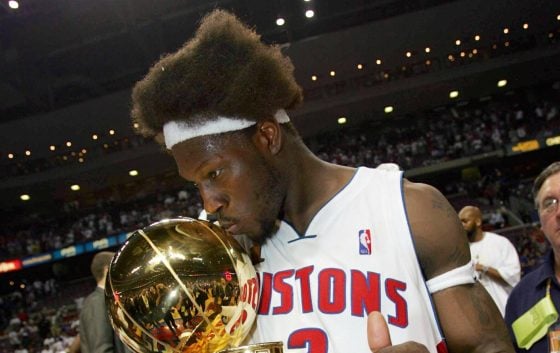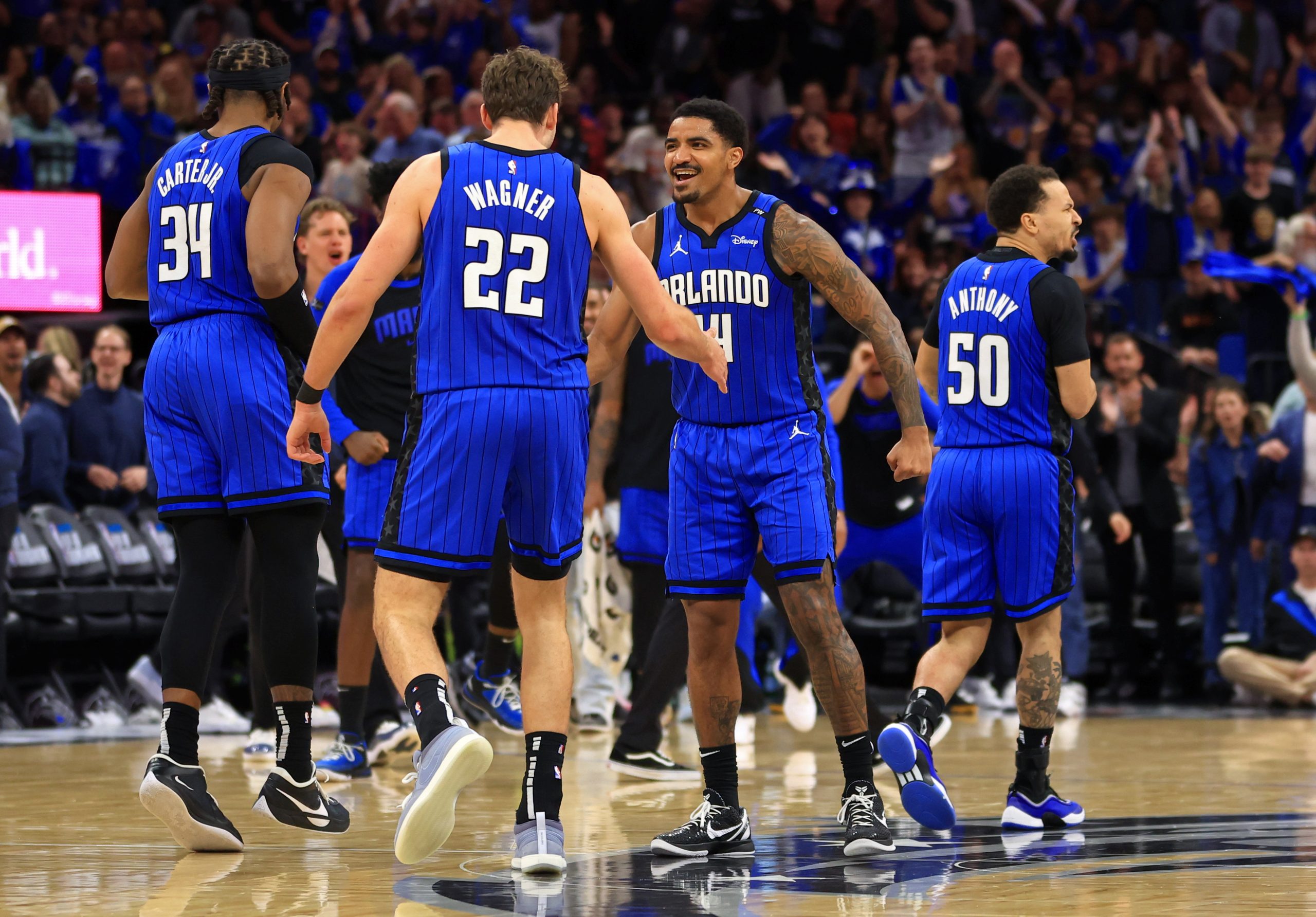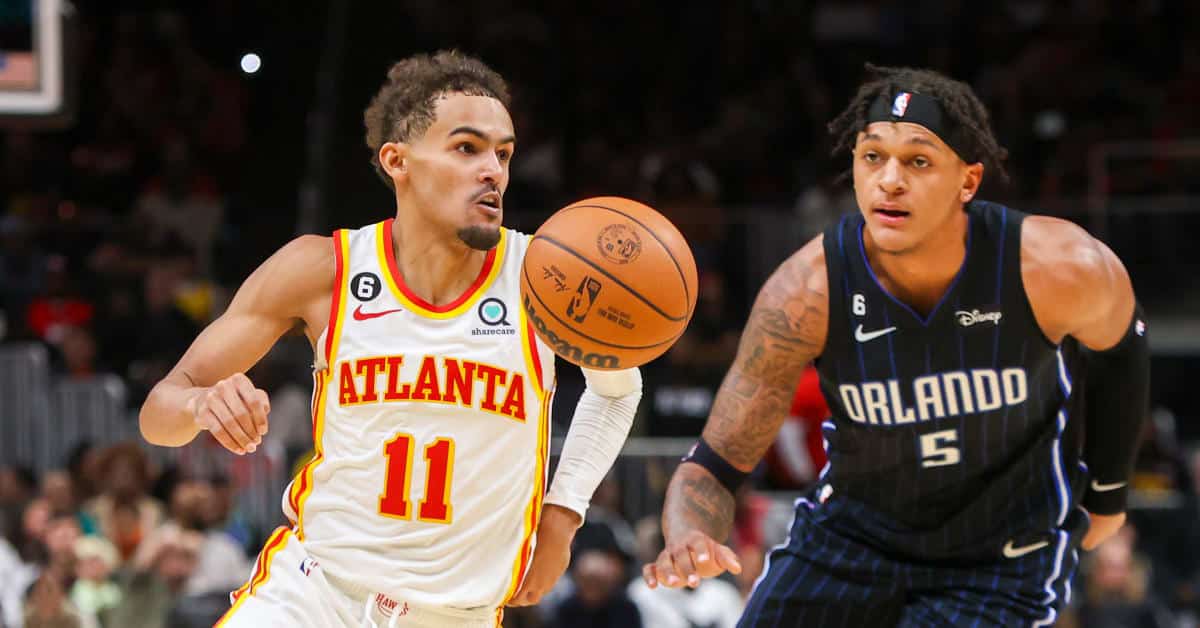The sight of Danilo Gallinari stumbling to the sideline, trainers spraying his knee with something and each report growing more grave on a summer Saturday raised an all-too-familiar feeling for Celtics fans: the washing away of hopes of a healthy season. The fear had been Gallinari’s two-year deal with Boston went off the rails before it began.
A Sunday MRI alleviated the worst concerns in the moments following his left knee injury playing for Team Italy in the World Cup qualifiers. Gallinari, 34, tore his left meniscus, and although there are 50 days until Opening Night and his absence won’t sink the team, it would take a hit on the depth structure the Celtics built this summer. For a team that fell to 11th place in the East shortly after New Year’s last season, tightened its rotation and scrambled at max intensity to rise up the standings last spring, Boston wanted to have a more balanced, flexible rotation in 2022-2023 to get to the playoffs a little more fresh and rested.
Gallinari allowed the Celtics to relieve the extraordinary load on Jaylen Brown, Jayson Tatum, Al Horford and Robert Williams III in the front court. Grant Williams can fill that role for the big men, but the loss of Daniel Theis in the Malcolm Brogdon trade looms larger now. While the team is high on Sam Hauser and Luke Kornet as big shooters, Gallinari is a professional scorer nearly two decades into his career; Hauser and Kornet are trying to show their G-League success can translate to regular NBA roles.
Even in a down season last year for Atlanta, Gallinari managed to hit 40% three-point shooting in catch-and-shoot opportunities on passes from Trae Young and he thrived from deep when he was left wide open (45.5%). Gallinari, at 6-10, 233-pounds, also had the ability to stand in front of some bigs and could’ve paired with Grant for extended stretches while the Celtics played small while resting Horford and Williams III.
“As we went through the playoffs and the different challenges, you see some series are better for some guys than others, but one of the things that I thought would be good is if we gave ourselves more options with a ‘small’ lineup,” Brad Stevens said.
“Obviously, we’re not small when you talk about Danilo and Malcolm. They’re big guys, but they’re very skilled and so they’re able to space the floor and play that way, and it just gives us more options in certain scenarios, in certain substitution patterns and even sometimes to start games, start halves if you want to … it’s great to have the green light to continue to add in any which way we need, but one of the things I’ll continue to focus on is adding without taking away.”
There’s potential for Ime Udoka to utilize Brogdon alongside Marcus Smart and Derrick White to help stagger Tatum and Brown’s playing time. These are the kind of adjustments that change the complexion of who the Celtics were last year.
Boston will inevitably start the same five players it did last year, Udoka said as much at Summer League in referring to his starters. How amicable will he be to small ball? It’ll be necessary if the Celtics hope to relieve those starters after a long postseason run.
Tatum played the most minutes in the NBA last season combining regular season and postseason totals at 3,714 minutes (37 per game), nearly 400 more than second-place Mikal Bridges. Jaylen Brown finished fifth with 3,140, even while playing only 66 games due to hamstring ailments. Smart logged 3,056 (8th) and 34-year-old Horford played 2,820 (18th). That wasn’t a product of making the NBA Finals either. Steph Curry, the Finals MVP, finished 10th overall with only Andrew Wiggins finishing in the top-10 among Warriors.
“Al Horford is expected to sit out most back-to-backs and have his minutes limited even further next season, according to team sources,” The Athletic’s Jared Weiss reported in July.
The end of the Kevin Durant saga will open the final stages of the NBA offseason back up. Boston has three regular season contracts available, with forthcoming training camp deals for Bruno Caboclo, Justin Jackson, Denzel Valentine, Noah Vonleh and Brodric Thomas pushing the team within one spot of its offseason limit. Depending on Gallinari’s surgical outlook which could range between weeks and months with a meniscus tear, the team could be forced to assess more playable options at the wing. They own $5.9-million and $6.9-million trade exceptions, but using either would escalate Boston’s luxury tax bill from $44.5 million to over $65 million.
As the roster stands, considering how Udoka managed his rotation last year, Tatum would probably play upwards of 40 minutes. Another playing time increase for the Williamses could ease Horford closer to 25-27 minutes per night. Boston snuck Horford down to 24.7 MPG over 11 games amidst a string of blowout wins into February, and Udoka highlighted Williams III’s importance entering next year after their Game 6 loss. Unless the team embraces some three-guard lineups, offsetting Horford minutes will trickle down to Brown and Grant.
Until it becomes clear Udoka will embrace Smart, Brogdon and White playing together, it is more likely Brogdon will fit into a majority of White’s 27.4 MPG from last season. White could find himself playing closer to Payton Pritchard’s 14.1 MPG, while Pritchard finds himself on the outside. That’s if Udoka leans into a tight rotation that prioritizes size being on the floor.
“It’s kind of who we’ve been with Marcus and down the line. When you go with Marcus, Jaylen and Jayson at the one, two, three, we’re pretty big across the back court,” Udoka said at Summer League. “Then bringing Derrick along, we didn’t lose a lot of what Marcus had, and so Malcolm fits right into that. (Brogdon) adds to what we like to do defensively: be a bigger, more physical team — not a lot of drop-off there whether we go two guards out there at the same time. They can all guard 1-through-4 pretty easily … (Gallinari) was a three most of his career, he’s kind of slid into that small-ball four lately and he can play some stretch five for us with his size and strength.”
Gallinari’s potential absence, fortunately for the Celtics, is similar to Aaron Nesmith’s inability to find minutes on last year’s team. There shouldn’t be a noticeable impact if everyone from last year’s lineup plays to their potential.
While White’s continued presence and any potential improvement with a full training camp adds to the team’s possibilities and depth, one more injury could place the team in a precarious position. Jackson, Thomas and Mfiondu Kabengele are available, but unproven.
Playing thin served the Celtics well last year. Their starting lineup became the most dominant in basketball, the cohesion they built led to historic results on the defensive side of the ball and they made it through the postseason relatively healthy. They hoped to be able to manage playing time differently after a hot start opening the door to rest days and less late-season urgency.
The Gallinari injury is an early hit on that front that’ll force Boston to lean back into their tendencies from one year ago, or seek a replacement with their TPE’s or free agency. Fortunately for the Celtics, the blow didn’t end up being as devastating as it appeared.
“It hurts tremendously. Not so much the knee, that yesterday gave way in a race that was still won with character,” Gallinari said on Instagram in Italian. “For that, it will take some time – fortunately less than expected – to return as before.”






